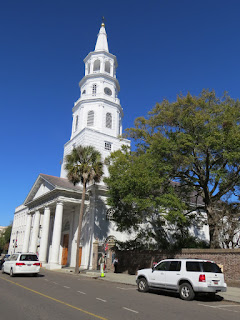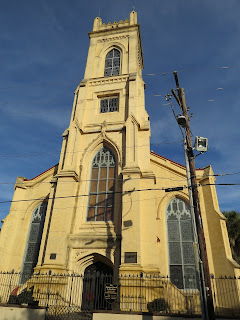Ashley Cooper, interestingly, would never come to or visit the Carolinas, but from afar in England, he would do a masterful job of marketing the area to those seeking a fresh start in the New World.
Among the incentives was freedom of religion. Ashley Cooper's "Promises of Religious Freedom from Fundamental Orders for Carolina" in 1669, which Charleston author and historian Ruth Miller has shared with my "Beyond the Grave" students, even gave religious freedom and freedom from religious-based harrassment to African slaves and "heathens, Jues, and other disenters from the purity of Christian religion."
And for a new church to form, it would need only seven members. This gave the Carolina colony unprecedented religious freedom. The urban center of Charleston would become a center of religious diversity in the 17th and 18th centuries.
Here is a listing of religions that were formed in Charleston, where the members came from, and churches or other markers that show their legacy today.
 |
| St. Michael's Episcopal Church |
Anglicans (later Episcopalians)
Origin: England
Powerful Church of England; Carolinas' state church
Churches today are St. Michael's (left) built in the 1730s and St. Philip's completed in 1836.
St. Michael's Church on Broad Street is the oldest surviving religious structure in Charleston.
 |
| Bethel United Methodist Church |
Methodists
Origin: England
Bethel United Methodist Church, located near the Addlestone Library at Calhoun and Pitt Streets, has the distinction of being the South's oldest Methodist congregation, dating to 1797.
 |
| Circular Congregation Church |
Origin: England
These Protestants "protested" the Anglican state church and formed their own "dissenting" church in 1681.
The Circular Congregational Church (United Church of Christ) is on Meeting Street. This beautiful structure with its "circular" form was built in the early 1800s by architect Robert Mills who would go on to design the Washington Monuments and other important structures.
 |
| First Baptist Church |
Baptists (formerly Anabaptists)
Origin: England
In 1682, 26 Baptists came to Charleston from Massachusetts where they had been persecuted.
First Baptist Church, on Church Street, dates to 1820. This is one of the oldest, if not the oldest, Baptist congregation in the South.
 |
| Quaker Cemetery Marker |
Quakers (Society of Friends)
Origin: England
Quaker name came from "feel God shake"
Quakers would gather in "Meeting Houses" rather than traditional churches. Quaker Charleston history dates to 1681 when S.C. Gov. John Archdale, a Charleton Quaker, deeded land on Meeting Street to the religious group.
Charleston had the oldest known Quaker cemetery until 1960 when the grounds where replaced and covered with a parking garage. This sign near the cemetery spot is all that remains of the Quaker presence in Charleston.
 |
| Unitarian Church |
Unitarians
Origin: England
The Unitarian Church on Archdale Street is home to a Unitarian Universalist congregation. This is considered the oldest Unitarian Church in the South.
Construction began in 1774 but was interrupted by the Revolutionary War and would not be completed in 1787. It was unofficially named The Archdale Street Meeting House (Wikipedia).
 |
| St. Matthew's Lutheran Church |
Lutherans
Origin: Germany (what the Central Europe region is called today)
St. Matthews Lutheran Church on King Street not far from Calhoun Street dates to 1872.
The congregation was founded in 1840 by a group of 50 Germans who wished to worship in their native language. Their original building was on Hasell and Anson Streets.
 |
| Huguenot Church |
Huguenots
Origin: France
These French Protestants fled from France and persecution from the ruling Catholic leadership.
This unique Gothic Revival structure on Church Street was built in 1844. The congregation dates to the 1680s in Charleston.
 |
| St. Mary's Roman Catholic Church |
Catholics
Origin: Haiti and Ireland
A slave insurrection in 1783 on the Caribbean island of Haiti led many Catholics there to flee to America.
St. Mary's Roman Catholic Church on Hasell Street is the oldest Catholic church in the South. This is the church's third structure, opening in 1839. The second structure was destroyed in the Charleston fire of 1838.
 |
| First (Scots) Presbyterian Church |
Presbyterians
Origin: Scotland
This Charleston congregation was established in 1731 when a dozen Scottish residents left the independent Church of Charleston, now the Circular Congregational Church (Wikipedia).
Scots are credited with first introducing golf to America when a shipment of clubs and balls arrived at the Charleston port in 1739.
First (Scots) Presbyterian Church on Meeting Street was opened in 1814.
 |
| KKBE Synagogue |
Jews
Origin: Spain and Portugal
Sephardic Jews, fleeing persecution in Spain and Portugal, founded the congregation that became known as Kahal Kadosh Beth Elohim (KKBE for short) Synagogue.
This sanctuary on Hasell Street is the second oldest synagogue building in the U.S. and the oldest in continuous use.
 |
| Emanuel AME Church |
African Methodist Episcopals (AME)
Origin: Slaves and former slaves
Morris Brown left Charleston's Bethel UMC and forms the AME church, along with 4,000 other former members at city Methodist churches. Brown began the Emanuel AME Church (first called the Hampstead Church) on Calhoun Street. It would be the founding AME church in the South, hence its "Mother Emanuel" name.
Denmark Vessey, one of the church's founders, was implicated in a slave revolt in 1822. He and five other organizers were executed after a secret trial (Wikipedia).
Charleston also has the Morris Brown AME Church on Morris Street.

This comment has been removed by a blog administrator.
ReplyDeleteThis comment has been removed by a blog administrator.
ReplyDelete